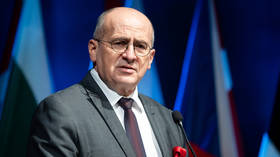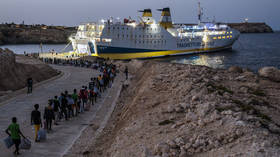
The scheme allegedly allowed thousands of migrants to enter the country

Poland Minister for Foreign Affairs Zbigniew Rau. © Mateusz Wlodarczyk/NurPhoto via Getty Images
Polish Foreign Minister Zbigniew Rau has insisted he will not step down despite a growing scandal over allegations that the nation’s consulates issued visas to migrants from Africa and Asia in exchange for bribes.
The controversy first emerged in late August when Deputy Foreign Minister Piotr Wawrzyk, who was responsible for consular and visa matters, was fired by Prime Minister Mateusz Morawiecki for a “lack of satisfactory cooperation.” Poland’s Central Anticorruption Bureau (CBA) subsequently launched an investigation into Wawrzyk’s activities.
The Gazeta Wyborcza newspaper later reported that the probe had exposed corruption that allowed tens of thousands of immigrants to enter the EU through international recruitment companies. Meanwhile, the Rzeczpospolita media outlet reported that the Foreign Ministry system had allowed people to “skip the queue” to obtain Polish visas for $4,000-5,000.
A parliamentary probe by the opposition Civic Coalition alliance suggested that as many as 350,000 visas issued to migrants from African and Middle Eastern countries could be under suspicion.

Read more
Attempting to control the fallout, Rau insisted on Monday that he does not feel “complicit” and even suggested that the scandal “does not exist.” The minister admitted to “irregularities” in the issuance of visas, but stated that only around 200 documents were involved. He further insisted that the figure pales in comparison with the 2 million visas issued by Poland in the last 30 months, mostly to Ukrainians and Belarusians.
“If this is the scandal of the century, I prefer to talk about a cascade of fake news,” Rau added, responding to claims by opposition leader Donald Tusk that the allegations were “the biggest scandal of the 21st century in Poland.”
The controversy erupted one month ahead of parliamentary elections in Poland, where the government has positioned itself as tough on migration. Senate Speaker Tomasz Grodzki, also a member of the opposition, joined Tusk in denouncing what he described as “corruption at the highest levels of government.”
Last week, Polish prosecutors announced that they had detained seven suspects in the case, none of whom were state officials. According to Rzeczpospolita, a key figure was named as ‘Edgar K’, an Indian businessman and associate of Wawrzyk, who allegedly acted as an intermediary in the scheme.




